4K Restoration releases its first list
The 20th Shanghai International Film Festival released its first list for the 4K Restoration. This list includes classics in film history by master directors, so it is literally a “heavy” one. This June, the audience will be able to enjoy the classics, revived by high-tech restorations with new radiance, on big screen during Shanghai International Film Festival.
Films on the list include The Battle of Algiers in which people bravely pursue freedom, Manhattan in which the urban middle class’s anxiety is portrayed vividly, The Tree of Wooden Clogs in which the tranquil country life in Italy is depicted, Leon in which Luc Besson combines tender love with cruelty, The Fifth Element which is Besson’s big-budget sci-fi work, and two movies by Japanese feministic Kenji Mizoguchi The Story of the Last Chrysanthemum and Ugetsu.
Since 2013 when old movies restored in 4K were first in theatre, Shanghai International Film Festival’s 4K Restoration Program has become one of the best choices for moviegoers to enjoy the classics. These films are no longer blurry and full of historic marks but clear and sharp as 4K quality promises. The restoration techniques will restore the scenes as they were when they were shot back in the old days, dusting off the time piling up on the old films. Making it possible for the audience to enjoy these films in modern movie theatres is also a cultural mission of Shanghai International Film Festival.
Screening List:
The Battle of Algiers
The Tree of Wooden Clogs
Léon
The Fifth Element
Manhattan
The Story of the Last Chrysanthemum
Ugetsu
The Battle of Algiers
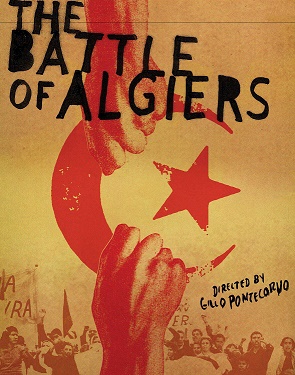
Director: Gillo Pontecorvo
Screenwriters: Franco Solinas, Gillo Pontecorvo
Starring: Brahim Hadjadj, Jean Martin, Yacef Saadi
Genre: Drama, history, war
Country: Italy, Algeria
The movie is set in Algeria from 1954 to 1962 when the country fought for its independence from French colonial rule. It tells the resistance against the rulers by an underground troop called the National Liberation Front of Algiers. Ali La Pointe is originally a thief on the street, but with his bravery and charisma, becomes one of the leaders in the independence war of Algeria. Being strictly organized, the group leads the Algerian people including women and children in carrying out assassinations of the rulers. When Ali is killed, the rulers think that they have finally had everything under control, but it is nothing but a temporary time-out before the real thunderstorm. Ali’s death doesn\'t mean there will be nobody to fight like him. Two years later, another wave of fighting rises up in Algeria. Through the director’s camera lens, the audience are delivered to the battlefield where fierce fighting is going on like torrents.
Recommender’s comment:The film won the Golden Lion at the Venice Film Festival, and it is a vanguard example of European films criticizing colonialism. The director cast local people in the film, and calmly, objectively and unbiasedly recorded the battles between both sides as they had been, presenting documentary-style the stirring years. One of the truly impressive scenes is when a French colonist, confused, asks repeatedly: “What do you want exactly?” an ordinary Algerian answers: “Freedom.” Simple as that.
The Tree of Wooden Clogs
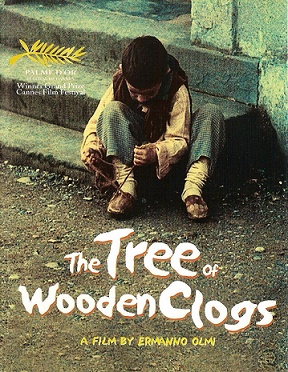
Director: Ermanno Olmi
Screenwriter: Ermanno Olmi
Starring: Luigi Ornaghi, Francesca Moriggi, Omar Brignoli, Antonio Ferrari, Teresa Brescianini
Genre: drama, history
Country: Italy
This film is what made Ermanno Olmi, a premier Italian movie director who won the lifetime achievement award at the Venice International Festival, rise to his fame. In terms of its style, The Tree of Wooden Clogs is almost a documentary, with no clear storyline throughout. Instead, this film presents the daily life of several rural families in a poverty-stricken village in North Italy in the late 19th century, portraying the poor, simple and plain life they led. The movie captures the pure perseverance and hope of the farmers and the audience can feel them themselves. Although it is a story about farmers from another country, when seeing the actors peeling corns and applying fertilizers, Chinese audience today might also find it relates to them, as they are reminded of what it was like in their childhood that’s fading away.
Recommender’s comment:In 1978, The Tree of Wooden Clogs, not widely known to the public, became the real surprise in Cannes and won the Golden Palm. As a film with no particular leading character or attractive plot, this flow-of-life film records only the daily life of the villagers. These farmers never shed a tear when faced with poverty and oppressions from the landlords. Life is hard and dull to them, but deep down in their hearts, they have the optimistic courage that would see them alive through all the hardship.
Léon
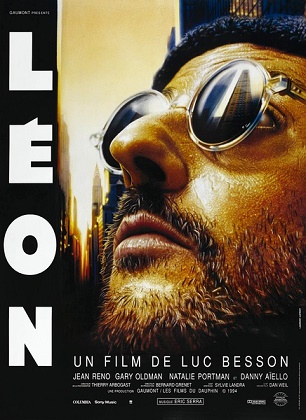
Director: Luc Besson
Screenwriter: Luc Besson
Starring: Jean Reno, Natalie Portman, Gary Oldman
Genre: Drama, action, crime
Country: France
It is a widely agreed opinion that this is a great movie, although it didn\'t receive many awards. It is a story about how two souls with nothing to lose fall in love with each other, and the love has inspired so many other souls in their understanding of love. Jean Reno plays a lonely hitman Leon who has only a plant by his side. One day, the 12-year-old girl living next door Mathilda comes home only to find that her family are all dead, so she goes to Leno’s for refuge. They begin to live together ever since. The girl teaches Leon how to read, and Leon teaches her how to use a gun. Mathilda never forgets that she must seek revenge, so she decides to act on her own. To save the little girl, Leon decides to take risks.
Recommender’s comment: When an awkward, aloof middle-aged man who still has a boy inside him meets a lovely and smart teenage girl, the two souls that both lack love start to get closer to each other and grow attached. Luc Besson uses calm and objective camera language to create the purest fairytale.
The Fifth Element
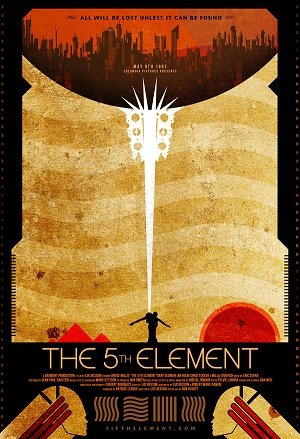
Director: Luc Besson
Screenwriters: Luc Besson, Robert Mark Kamen
Starring: Bruce Willis, Gary Oldman, Milla Jovovich, Ian Holm, Chris Tucker, Luke Perry, Brion James, Tommy ‘Tiny’ Lister, Lee Evans
Genre: Action, science fiction, adventure
Country: France
As a world-famous movie director, Luc Besson has touched on a wide range of subjects, and The Fifth Element is a science fiction of his. The imagination, storyline and special effects in this film are the tools with which Besson creates a totally new world to the audience and brings them exceptional visual experiences. The famous “opera scene” in outer space and the theme song still remain classics relished by the audience today. The story takes place in New York in 2259 when an evil power in the universe comes to the earth and tries to rule it. Human lives hang over a thread, facing the risk of falling into the dark abyss forever. Kind aliens try to help and save humans, but the Fifth Element they send to the earth has been attacked and destroyed. At this critical moment, humans recover the Fifth Element and create a beautiful red-headed girl Leeloo. Leeloo and Korben, a former agent and currently a taxi driver, work together and finally save the world.
Recommender’s comment:20 years ago when it was released, The Fifth Element made a frenzy for science fictions among its audience. 80 million dollars spent on special effects was the new record back then. The storyline was also often copied or imitated in the following few years. However, this was the last movie that used traditional ways to make special effects, as 6 months after the film was in theatre, the digital era came.
Manhattan
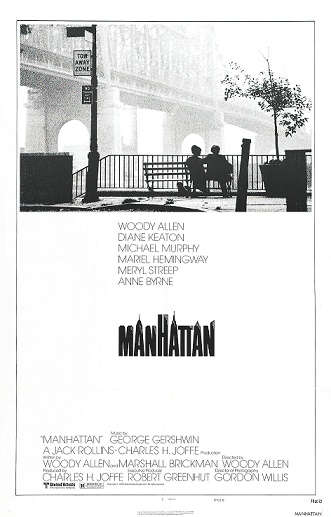
Director: Woody Allen
Screenwriters: Woody Allen, Marshall Brickman
Starring: Diane Keaton, Meryl Streep, Woody Allen, Michael Murphy, Mariel Hemingway
Genre: Drama, comedy, romance
Country: U.S.
Manhattan is a masterpiece by the famous director Woody Allen. With rick Woody Alan vibe, the film is about life and romance of middle-class intellectuals. The dialogs in it are a little bit chatty yet irresistible. Woody Alan plays a writer himself who is not successful in his career, nor does he enjoy a carefree relationship. Although this writer has no intention of working hard on this age-gapped relationship, his 17-year-old girlfriend swoons over him even more, while his ex-wife plans on writing a book to reveal their private married life to the public. At this time, he runs into the lover of his friend, Mary, and they fall in love immediately. What does the future have in store for these lonely men and women in this busy and lonely town, Manhattan?
Recommender’s comment:The chatterbox-personality of Woody Allen has been showcased to the fullest in this film. The many classic quotes and lines are not only funny and witty, but are used by Woody Allan to satirize the middle class. They try to change the world but they are too timid to do so. They even can’t figure out what love is. They can do nothing but continue to live confused and aimless.
The Story of the Last Chrysanthemum
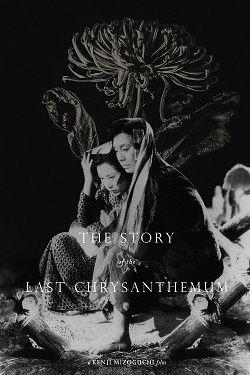
Director: Kenji Mizoguchi
Screenwriters: Matsutarō Kawaguchi, Shôfû Muramatsu, Yoshikata Yoda
Starring: Shôtarô Hanayagi, Kôkichi Takada, Kakuko Mori, Gonjurô Kawarazaki, Tokusaburo Arashi, Yôko Umemura
Genre: Drama
Country: Japan
Kenji Mizoguchi, Yasujiro Ozu, Akira Kurosawa and Mikio Naruse are the four great directors of Japan. Kenji Mizoguchi’s specialty is the narration of tragedies of women, so he is known as a feminist and realist movie master. The Story of the Last Chrysanthemum, one of his trio on the Kabuki theme, depicts the tragic life of a woman enslaved and sacrificed. In the film, Kikunosuke Onoe is the heir of a famous Kabuki actor, but he doesn\'t live up to his fame. When people around him flatter and appraise him, the only person who frankly speak out the truth is his maid, a kind and innocent woman. He starts to feel for her, but the two have a large gap in social status, so their relationship is gossiped by people. But the maid never gives up on him; instead, she sacrifices all she has for the man she loves.
Recommender’s comment:It is often said that there is always a great woman behind a successful man. The film that came out in 1939 may have offered the best interpretation of the saying above mentioned. However, the obsolete and absurd social norms destroy the couple. When the man steps higher up to the top of the world, the woman who has helped him become who he is now remains as lonely and humble as she used to be.
Ugetsu
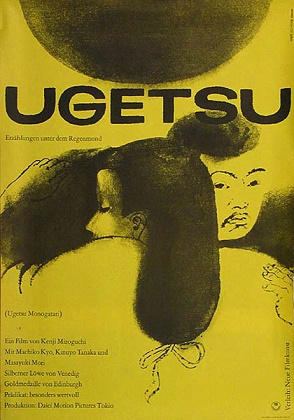
Director: Kenji Mizoguchi
Screenwriters: Matsutarō Kawaguchi, Yoshikata Yoda, Ueda Akinari, Hisakazu Tsuji
Starring: Kinuyo Tanaka, Masayuki Mori, Eitarô Ozawa, Mitsuko Mito, Machiko Kyō
Genre: Drama, mystery, fantasy
Country: Japan
Ugetsu is widely regarded as the most artistically acclaimed work of Kenji Mizoguchi’s, which won the director the Silver Lion Award at the Venice International Film Festival, marking a milestone of Japanese films into the international arena. Since then Kenji Mizoguchi and his contemporary Akira Kurosawa together turned a new chapter in Japanese cinema among the international film industry. Ugetsu is a film full of the oriental charms, ancient and tranquil, like a moving ink and water scroll. The scenes are really elegant and beautiful, to echo the story which should also be revisited time and time again. Set in the Azuchi-Momoyama period Japan, the story is about two men, one wanting to make fortunes during the war and the other planning to become a samurai. They both realize their dreams quick enough. But Genjurō meets a beautiful lady, Miyagi, who is a ghost and happily marries her, while his wife has been murdered back home; Genjurō’s brother leads an army, but his wife is raped and becomes a prostitute.
Recommender’s comment:Kenji Mizoguchi conveys respect and sympathy for women through his films. The use of lens is remarkable. Take the long shot towards the end for example, the director, though modest and low-profile, plays the time-space-changing technique skillfully to show how much Genjurō misses his late wife. This part of the movie is also a visual miracle that will go down in film history.







